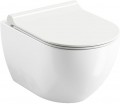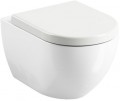Functions
Among the basic functions of the toilet, one can single out
circular flush of water in the bowl,
half flush,
antibacterial coating, anti-
splash, micro-lift of the
seat. More about them:
— Vortex flush (in the bowl). In toilets with a vortex flush, water flows from holes under the rim and sequentially washes the entire bowl through the formation of a characteristic water vortex. Jets of water can be directed from the outlets straight or at a slight angle: the first option is called swirling, the second – shower. The advantages of a vortex flush are low water consumption, high-quality cleaning of the toilet, absence of splashes and minimal noise levels. However, sanitary equipment with such a flush system are often more expensive than traditional solutions.
- Half drain. The ability to drain from the tank not all the water, but only a part, usually half (hence the name). It is due to the fact that a complete drain is not always required - for example, half a tank is enough to flush urine even in toilet bowls with a plate bowl (see "Bowl Shape"). This function will be useful primarily for those for whom water saving is critical (for example, if meters are installed in the apartment).
- Anti-splash. The anti-splash system prevents water splashing on the sides when the water is drained
...from the tank. Anti-splash toilets have a special bowl design. In them, the bowl is inclined, the water flowing down the inclined plane from the tank immediately goes into the sewer drain. The "anti-splash" function allows you to increase the level of hygiene and sanitation in the restroom. Toilets with an anti-drain system also have disadvantages. The main disadvantage of such models is the increased water consumption.
— Seat microlift. A device that prevents the toilet seat from hitting the rim of the bowl. It works similar to door closers: the movement of the seat is slowed down, slowing down as much as possible when approaching the rim, which ensures soft contact, prevents unpleasant popping and protects the seat and rim from damage and wear. In addition, the microlift provides additional convenience - you just need to push the seat, and it will lower itself.In box
Additional items supplied with toilet bowl.
—
Drain tank. The tank in which the water is stored for drainage. By definition comes complete with toilet comps (see. «Type»), although some of these models may have the option «without tank». But the traditional toilet bowls are very rarely sold immediately with a tank for plumbing - it is believed that this element of design in such cases is more convenient to choose separately.
—
Seat with cover. A seat for comfortable placement on the toilet, supplemented by a lid that covers the bowl in «non-working time» and keeps unpleasant odors and harmful microorganisms inside. Both seats and covers are sold separately, but it is more convenient (and sometimes cheaper) to buy them together with the toilet. Especially this configuration can be useful when buying products of non-standard form, to which it is difficult to choose third party accessories.
Country of origin
The country of origin of the brand under which the toilet is marketed. Nowadays, on sale you can mainly find products from such countries (in alphabetical order):
Belgium,
Germany,
India,
Spain,
Italy,
Poland,
Turkey,
France,
Czech Republic,
Switzerland,
Sweden,
Japan.
There are many stereotypes related to how the origin of goods from a particular country affects their quality. However, in general, these stereotypes are unfounded. Firstly, this paragraph does not indicate the actual place of manufacture of the toilet bowl, but the "homeland" of the trademark (or the location of the manufacturer's headquarters); production facilities may be located in another country. Secondly, the actual quality of the product depends not so much on geography, but on the organization of processes within a particular company. So when choosing, it is best to focus not so much on the "nationality" of the toilet, but on the overall reputation of a particular brand. And paying attention to the country of origin makes sense if you fundamentally want (or do not want) to support a manufacturer from a
...certain state.
